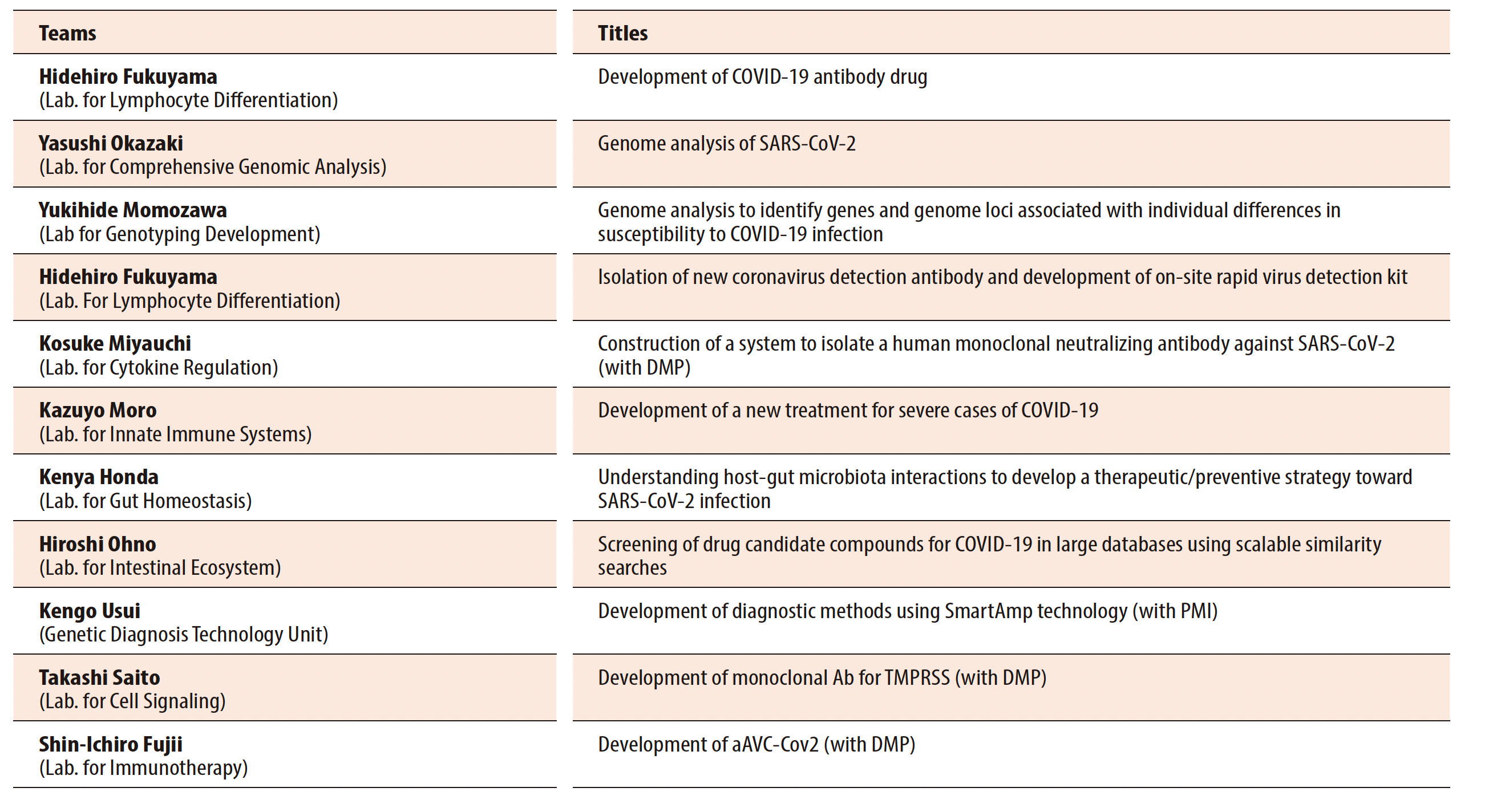Projects
Covid-19 projects in IMS
Coronavirus disease 2019 (COVID-19) caused by SARS-CoV-2 has recently become a pandemic.
The sudden emergence and spread of SARS-CoV-2 poses a threat to global health and the economy over the world.
Although a new vaccine for the SARS-CoV-2 may be available in many countries in the near future,
the development of strategies to prevent the virus's spread is still needed.
At present, several groups in IMS are developing tools for COVID-19 diagnosis, prevention and therapy.
For the development of diagnostics and biomarkers,
Usui’s group already constructed a SARS-CoV-2 detection kit based on the original isothermal amplification technology “SmartAmp method”.
The usefulness of this kit was evaluated with viral genomic RNA of actual SARS-CoV-2 isolated from passengers of the Diamond Princess cruise ship, which was quarantined in Yokohama.
The kit was approved by the Pharmaceuticals and Medical Devices Agency in August 2020.
Momozawa’s group is working to discover biomarkers based on the idea that individual differences in immunity-related genes may affect the severity of clinical phenotypes of infection.
The identification of such individual differences could reveal the mechanisms of COVID-19 that lead to various clinical outcomes.
They participate in a global consortium called the COVID Human Genetic Effort and perform whole genome and targeted sequencing in patients.
For COVID-19 treatment, many groups are working on SARS-CoV-2 projects. Among them,
several groups are collaborating with RIKEN Drug Discovery and Medical Platforms (DMP).
Miyauchi’s group previously reported studies of neutralizing antibodies against influenza viruses,
in which live influenza virus infection induced broad-spectrum neutralizing antibodies in a TFH cell-dependent mechanism.
They have applied this knowledge to the generation of monoclonal antibodies (mAb) against CoV-2. So far,
they established many hybridoma clones producing anti-CoV-2-S antibody,
which were generated from lymph node B cells after co-administration of the CoV-2-spike (S) protein and live influenza viruses to mice.
Saito’s group is working on a different type of neutralizing antibody, one for TMPRESS2.
TMPRSS2 is critical for viral entry based on studies showing that small molecule inhibitors of TMPRSS2 inhibit SARS-CoV-2 infection.
However, these inhibitors have some side effects and his group thinks that TMPRSS2 mAb may more specifically inhibit the infection.
As a Drug Discovery Antibody Platform Unit, they have tried to establish human TMPRSS2 mAb to inhibit SARS-CoV-2 infection.
Fukuyama’s group already isolated several therapeutic human mAbs from COVID-19 patients in collaboration with Keio University.
In addition, they showed a vaccine adjuvant effect of vitamin D3 that may lead to a safer COVID-19 vaccine by regulating the vitamin D3 pathway.
Fujii’s group previously established the concept of the artificial adjuvant vector cell (aAVC) system against cancer and have now extended it to COVID-19. They established SARS-CoV-2-derived antigenexpressing aAVC (aAVC-CoV-2), and will perform a proof of concept study for anti-viral cytotoxic T cell induction as well as anti-SARS-CoV-2 Ab in vaccinated animals. Recent advances as IMS projects in the fields of diagnostics,
treatment and vaccine development for SARS-CoV-2 infection are summarized in Table 1.

Table 1: COVID-19-related research conducted at IMS



